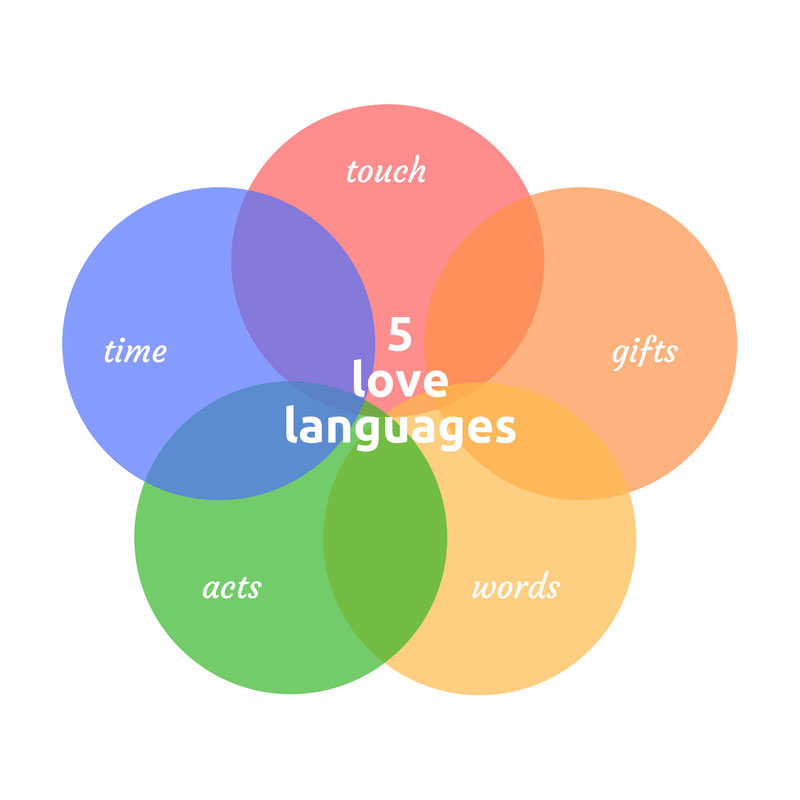I’m sure you’ve heard about the 5 Love Languages. If not, it’s a popular framework that explores the different ways we feel most loved.
All five tend to feel good, but most people have one that really resonates — a “primary” love language. And when we receive it, it can feel like fireworks going off in the brain.
But here’s the challenge: many couples don’t speak the same love language. And that can lead to misunderstandings, conflict, and feeling emotionally distant — even when both partners are trying.
Let’s take a closer look at what these love languages are, how mismatches show up in relationships, and why it’s sometimes so hard to give love the way your partner needs.
What are the 5 Love Languages?
Originally coined by Dr. Gary Chapman, the 5 love languages describe how people tend to express and receive love:
- Words of affirmation – spoken or written expressions of care, appreciation, or admiration
- Physical touch – non-verbal affection, like hand-holding, cuddling, or sexual intimacy
- Quality time – focused, undistracted time together
- Acts of service – doing helpful or supportive things for your partner
- Gifts – thoughtful items that reflect love or attention
While all five can feel meaningful, one typically feels most emotionally significant to each person.
Why Love Languages create conflict
In therapy, we often hear things like:
“Why is it so hard to leave me a love note? You know how badly I need that.”
“I’ve asked you for months to plan a date — you never make it a priority.”
To which the partner might respond:
“But I do the grocery shopping every week.”
“I just bought you the purse you wanted.”
This is a common pattern: both people are trying, but in different ways. They’re giving love in the language that makes sense to them — not necessarily the one their partner needs.
Try this reflection exercise
Before jumping into problem-solving, try asking yourself these two things:
1. What does my partner consistently ask for or light up about?
This is often a clue to their primary love language.
2. Why might giving them that love language feel hard for me?
Here are some common emotional blocks:
- You don’t feel confident expressing emotions verbally
- After a long day or feeling burned out, physical touch feels draining
- You don’t value quality time in the same way, so you forget to plan it
- You feel neglected or unloved yourself — like you’re running on empty
These are not flaws. They’re places to slow down, get curious, and explore.
Why it’s okay to struggle — and still important to try
We’re not all wired the same way. And it’s easy to fall into giving ourselves a pass when we don’t know how to show up in our partner’s language.
But when that pass turns into avoidance, it often creates more pain. Your partner may begin to feel invisible, unheard, or unloved, even if you care deeply.
The antidote? Start talking about it. Let them know you see the gap — even if you don’t know how to close it yet.
How to talk about love languages with care
Voicing your struggle to give love, and your awareness of the gap, is often more powerful than saying nothing at all.
Here are two ways to acknowledge the challenge while inviting connection:
If your partner needs quality time:
“I know this is really important to you. I get stuck trying to come up with something exciting to do. What if I pick the day and time, and we come up with ideas together?”
If your partner needs physical touch, but you’re touched out:
“Since having the baby, I’ve been in survival mode. I want to feel close to you, but I’m still figuring out how to feel like a sexual person again. Can we set aside time to be romantic — without pressure to go further?”
Honesty creates room for empathy. Don’t wait for the perfect time — just aim for a good enough moment.
Love languages aren’t about getting it perfect
You’re going to miss each other sometimes. You’ll give what you wish your partner wanted, and they’ll do the same.
But that’s not failure — that’s normal.
The real opportunity is learning how to bridge the gap:
- By naming what’s hard
- By staying open to your partner’s needs
- And by creating small moments of emotional repair
Reconnect with support
If you and your partner feel stuck — especially during seasons of stress, parenting, or distance — therapy can help.
You don’t need to “fix it all.” You just need space to explore what’s getting in the way of connection.
